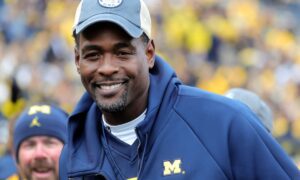The Best Shortstops in baseball is the next installment of the MLB & college baseball series for KnupSports.
There have certainly been many great shortstops in Major League Baseball’s history. This is my attempt to identify the top-10 of all-time and then dive into some best SS of the current year.
10 Best Shortstops of All Time in the MLB
Let’s dive into the 10 best shortstops of all time one by one.
10. Barry Larkin
He has a lifetime WAR of 70.5 and is considered one of the top players of his era, winning nine Silver Slugger awards, three Gold Glove awards, and the 1995 National League Most Valuable Player Award. He was selected to the Major League All-Star Game twelve times and was one of the pivotal players on the 1990 Reds’ World Series championship team. Larkin was elected to the National Baseball Hall of Fame in January 2012 and was inducted on July 22, 2012.
9. Alan Trammell
saw playing time at multiple defensive positions, including shortstop, third base, second base, left field, center field, and designated hitter.[ Trammell retired following the 1996 season.
In his 20-year career, Trammell batted over .300 seven times, ending with a career average of .285 and 185 home runs with 1,003 RBI, 1,231 runs, 2,365 hits, 412 doubles, 55 triples, 236 stolen bases, and 850 walks in 2,293 games. He compiled a .977 fielding percentage at shortstop, his primary position. After his retirement, Trammell coached for Detroit (1999, hitting coach), the San Diego Padres (2000–2002, first base coach), and managed the Tigers (2003–2005).
He served as the bench coach for the Arizona Diamondbacks under former teammate Kirk Gibson until returning to the Tigers in late 2014 as a special assistant to the general manager. He finished with a 70.7 WAR
8. Arky Vaughan
Vaughan retired with 1,173 runs scored, 96 home runs, 926 RBI, 118 steals, and a .318 batting average, a 406 on-base percentage and a .453 slugging percentage. As of 2019, his .385 batting average, .491 OBP, and 1.098 OPS in 1935 are all Pittsburgh team records, and the batting average is a 20th-century record for National League shortstops. Vaughan is the 26th greatest non-pitcher in major league history, according to win shares. He hit for the cycle twice in his career as a member of the Pirates.
In 14 seasons, he hit .300 or better 12 times, only missing the mark in 1942 and 1948. He was inducted into the National Baseball Hall of Fame in 1985. His lifetime WAR was 78..0.
7- Derek Jeter
Jeter spent his entire 20-year Major League Baseball (MLB) career with the New York Yankees. He was elected to the Baseball Hall of Fame in his first year of eligibility in 2020; he received 396 of 397 possible votes (99.75%), the second-highest percentage in MLB history (behind only teammate Mariano Rivera) and the highest by a position player. He was the chief executive officer (CEO) and part owner of the league’s Miami Marlins from September 2017 to February 2022.
A five-time World Series champion with the Yankees, Jeter is regarded as a central contributor to the franchise’s dynasty during the late 1990s and early 2000s for his hitting, base-running, fielding, and leadership. He is the Yankees’ all-time career leader in hits (3,465), doubles (544), games played (2,747), stolen bases (358), times on base (4,716), plate appearances (12,602) and at-bats (11,195).
His accolades include 14 All-Star selections, five Gold Glove Awards, five Silver Slugger Awards, two Hank Aaron Awards, and a Roberto Clemente Award. Jeter was the 28th player to reach 3,000 hits and finished his career ranked sixth in MLB history in career hits and first among shortstops. In 2017, the Yankees retired his uniform number 2. His lifetime WAR was 73.0.
6- Ernie Banks
Banks finished his career with 512 home runs; his 277 home runs as a shortstop were a career record at the time of his retirement. (Cal Ripken Jr. now holds the record for most home runs as a shortstop with 345. Banks holds Cubs records for games played (2,528), at-bats (9,421), extra-base hits (1,009), and total bases (4,706). Ernie Banks played 19 seasons for the Cubs.
He had a .274 batting average, 2,583 hits, 512 home runs, 1,636 RBIs, and 1,305 runs scored. He won 1 Gold Glove award and 2 MVP awards. He was inducted into the Hall of Fame in 1977.
Banks also excelled as an infielder; he won an NL Gold Glove Award for shortstop in 1960. He led the NL in putouts five times and was the NL leader in fielding percentage as shortstop three times and once as first baseman. His career WAR was 63.3.
5. Ozzie Smith
Smith played shortstop for the San Diego Padres and St. Louis Cardinals in Major League Baseball, winning the National League Gold Glove Award for defensive play at shortstop for 13 consecutive seasons. A 15-time All-Star, Smith accumulated 2,460 hits and 580 stolen bases during his career and won the National League Silver Slugger Award as the best hitter at shortstop in 1987.
He was elected to the Baseball Hall of Fame in his first year of eligibility in 2002. He was also elected to the St. Louis Cardinals Hall of Fame in the inaugural class of 2014. His all-time WAR is 64.7.
4. Robin Yount
Yount holds Brewers career records for games, at-bats, runs, hits, doubles, triples, RBIs, total bases, walks and strikeouts. He was the last active major leaguer to have been a teammate of Hank Aaron (1975–1976). He posted a career .285 batting average with 251 home runs, 3,142 hits, 1,632 runs scored, 583 doubles, 126 triples, 1,406 RBI, 271 stolen bases, and 966 walks.
His 11,008 career at-bats is the ninth-most in Major League Baseball history (through the end of the 2020 season), and he ranks 20th on the all-time hit list. His three All-Star appearances are tied with Ferguson Jenkins for the second-fewest of any Hall of Famer from the All-Star Game era, and he won a second MVP Award in 1989 without making the All-Star Team.
He finished with a 73.7 WAR.
3. Cal Ripken
One of his position’s most productive offensive players, Ripken compiled 3,184 hits, 431 home runs, and 1,695 runs batted in during his career, and he won two Gold Glove Awards for his defense. He was a 19-time All-Star and was twice named American League (AL) Most Valuable Player (MVP).
Ripken holds the record for consecutive games played (2,632), having surpassed Lou Gehrig’s streak of 2,130 that had stood for 56 years and that many deemed unbreakable. In 2007, he was elected to the National Baseball Hall of Fame in his first year of eligibility with 98.53% of votes, the sixth-highest election percentage ever. His career WAR is 92.5
2. Alex Rodriguez
With a career .295 batting average, Rodriguez amassed over 600 home runs (696), over 2,000 runs batted in (RBI), over 2,000 runs scored, over 3,000 hits, and over 300 stolen bases, the only player in MLB history to achieve all of those feats. He was also a 14-time All-Star, winning three American League (AL) Most Valuable Player (MVP) Awards, 10 Silver Slugger Awards, and two Gold Glove Awards. Rodriguez is also the career record holder for grand slams.
He twice broke the record for the largest sports contract ever signed. He also admitted using banned performance-enhancing drugs from 2001 to 2003 and was consequently suspended for the entire 2014 season. Rodriguez is ranked first in career Wins Above Replacement for shortstops of the modern era (post–1901) at 113.7.
1. Honus Wagner
- Finished with a 138.1 WAR
- World Series champion (1909)
- 8× NL batting champion (1900, 1903, 1904, 1906–1909, 1911)
- 5× NL RBI leader (1901, 1902, 1908, 1909, 1912)
- 5× NL stolen base leader (1901, 1902, 1904, 1907, 1908)
- Pittsburgh Pirates No. 33 retired
- Pirates Hall of Fame
- Major League Baseball All-Century Team
- Major League Baseball All-Time Team
Outside: Luis Aparicio. Pee Wee Reese, Lou Boudreau, Luke Appling
That’s a glance at our 10 best MLB shortstops of all time.
Best Shortstops by Decades 1870-2010
1870- BEST SHORTSTOP EZRA SUTTON –
He hit the first ever professional home run on May 8, 1971. Also, he hit .294
in his career for a batting average along with 2574 hits, 28 home runs, 672 runs batted in .
1880-BEST SHORTSTOP EZRA SUTTON –
He hit the first ever professional home run on May 8, 1971. Also, he hit
.294 in his career for a batting average along with 2574 hits, 28 home runs, 672 runs batted in .
1890- BEST SHORTSTOP HUGHIE JENNINGS-
He played from June 1, 1891 through September 2, 1918 in professional baseball.In his career, he finished with a .311 batting average, 18 home runs and 840 runs batted in. He also led the league one season with 51 hit by pitches along with 2 time league championships and was selected to the National Baseball Hall of Fame in 1945.
1900- Honus Wagner – who played 21 seasons in Major League Baseball from 1897 to 1917,
almost entirely for the Pittsburgh Pirates. Wagner won his eighth (and final) batting title in 1911,
a National League record that remains unbroken to this day, and matched only once, in 1997,
by Tony Gwynn. He also led the league in slugging six times and stolen bases five times.
Wagner was nicknamed “the Flying Dutchman” due to his superb speed and German heritage.
This nickname was a nod to the popular folk-tale made into a famous opera by the German
composer Richard Wagner. In 1936, the Baseball Hall of Fame inducted Wagner as one of the
first five members. He received the second-highest vote total, behind Ty Cobb’s 222 and tied
with Babe Ruth at 215.Most baseball historians consider Wagner to be the greatest shortstop
ever and one of the greatest players ever. Ty Cobb himself called Wagner “maybe the greatest
star ever to take the diamond”
1910- Honus Wagner – played 21 seasons in Major League Baseball from 1897 to 1917, almost
entirely for the Pittsburgh Pirates. Wagner won his eighth (and final) batting title in 1911, a
National League record that remains unbroken to this day, and matched only once, in 1997, by
Tony Gwynn. He also led the league in slugging six times and stolen bases five times. Wagner
was nicknamed “the Flying Dutchman” due to his superb speed and German heritage.
This nickname was a nod to the popular folk-tale made into a famous opera by the German
composer Richard Wagner. In 1936, the Baseball Hall of Fame inducted Wagner as one of the
first five members. He received the second-highest vote total, behind Ty Cobb’s 222 and tied
with Babe Ruth at 215.
Most baseball historians consider Wagner to be the greatest shortstop
ever and one of the greatest players ever. Ty Cobb himself called Wagner “maybe the greatest
star ever to take the diamond”
1920- Joe Sewall – Playing with Cleveland until 1930 and the New York Yankees from 1931 to
1933, Sewell batted .312 with 1,141 runs, 1,054 RBI, 436 doubles, 68 triples, 49 home runs, 842 bases on balls and a .391 on-base percentage. He regularly scored 90 or more runs a season and twice topped the 100 RBI plateau in 1923 and ’24.
1930- Red Rolfe – Rolfe became the Yankees starting shortstop in 1934, with Don Heffner,
who played second base alongside Rolfe with Newark, becoming the Yankees’ starting second
baseman, and second baseman Tony Lazzeri and shortstop Frankie Crosetti playing as third
basemen. However, Heffner struggled and manager Joe McCarthy decided that Rolfe’s throwing
arm made him a better third baseman, as Lazzeri moved back to second base and Crosetti
returned to shortstop.
He batted .287 in 89 games, as a knee injury experienced when he
collided with Max Bishop of the Boston Red Sox limited his playing time. Rolfe became their
starting third baseman in 1935
1940- Lou Boudreau – was a college p;ayer and a was a dual-sport athlete in baseball and
basketball, earning All-American honors in basketball for the University of Illinois.
Boudreau was an All-Star for seven seasons. In 1948, Boudreau won the American League
Most Valuable Player Award and managed the Cleveland Indians to the World Series title.
He won the 1944 American League (AL) batting title (.327), and led the league in doubles in 1941,
1944, and 1947. He led AL shortstops in fielding eight times. Boudreau still holds the MLB
record for hitting the most consecutive doubles in a game (four), set on July 14, 1946.
1950- Ernie Banks -was a lifetime player for the Chicago Cubs as he made his major league
debut on September 17,1953 and his final game on September 26, 1971. In his career he
finished with a .274 batting average, 2583 hits, 512 home runs and 1636 runs batted in. Ernie
was known for his saying, ‘let’s play two”. Banks awards included being a 14 time All Star, 2
time National League MVP, 1 Gold Glove, 2 time home run leader in the National League and 2
time RBI leader. He was inducted into the Baseball Hall of Fame in 1977.
1960- Dick McAuliffe – played for the Detroit Tigers and hit .247 in his lifetime, he hit 197 home
runs and drove in 697 runs in his career. Also, he was a 3 time All Star and was a very solid
fielder.
–
1970- Toby Harrah His primary team was the Texas Rangers. In his career, he hit .264 with
195 home runs and 918 runs batted in. He played from 1969-1986. Harrrah was a 4 time All
Star with his best season being 1982 when he hit .304 and drove in over 100 runs.
1980- Cal Ripken Jr. – was drafted by the Orioles in the second round of the 1978 MLB draft.
He reached the major leagues in 1981 as a shortstop but moved to third base in 1982, but the following year, he was shifted back to shortstop, his long-time position for Baltimore. That year,
Ripken also won the AL Rookie of the Year Award and began his consecutive games played
streak.
In 1983, he won a World Series championship over the Philadelphia Phillies and his first
AL MVP Award. One of Ripken’s best years came in 1991 when he was named an All-Star(19
times total), won the Home Run Derby, and was the recipient of his first All-Star Game MVP
Award, his second AL MVP Award, and first Gold Glove Award.
He broke the consecutive games played record on September 6, 1995, in his 2,131st consecutive game, which fans voted as the league’s “most memorable moment” in the history of the game in an MLB.com poll; Ripken voluntarily ended his 17-year streak at 2,632 games before the final home game of the
1998 season. He switched back to third base for the final five years of his career. In 2001, his
final season, Ripken was named the All-Star Game MVP. In 2007, he was selected to the Hall
of Fame.
1990- Barry Larkin -he was born, raised and played his entire career in Cincinnati. He played
from 1986-2004. His career average was .295 with 2340 hits, 188 home runs, 960 runs bated in.
Hwe was a 12 year Sll Star and a NL MVP once along with 2 tome Gold Glove winner and 9
time Silver Slugger winner.He was elected to the Baseball Hall of Fame in 2012.
2000- Derek Jeter – Jeter played for the Yankees from 1995-2014. A five-time World Series
champion with the Yankees, Jeter is regarded as a central contributor to the franchise’s dynasty
during the late 1990s and early 2000s for his hitting, base-running, fielding, and leadership. He
is the Yankees’ all-time career leader in hits (3,465), doubles (544), games played (2,747),
stolen bases (358), times on base (4,716), plate appearances (12,602) and at bats (11,195).[1]
His accolades include 14 All-Star selections, five Gold Glove Awards, five Silver Slugger
Awards, two Hank Aaron Awards, and a 2009 Roberto Clemente Award.
Jeter was the 28th player to reach 3,000 hits and finished his career ranked sixth in MLB history in career hits and first among shortstops. In 2017, the Yankees retired his uniform number 2. Elected to the Hall of
Fame in 2020.
2010- Troy Tulowitki-Tulowitzki is a five-time MLB All-Star, a two-time Gold Glove Award
winner, and a two-time Silver Slugger Award winner. The Rockies traded him to the Blue Jays in
- Tulowitzki missed most of the 2017 season and all of the 2018 season with injuries, and
the Blue Jays released him after the 2018 season. In 2019, he signed with the Yankees, playing
the first five games of the season before being sidelined with a calf strain; after experiencing
setbacks, he announced his retirement from baseball in late July.
Let’s take a quick look at the top shortstops from college baseball as well.
Best Shortstops in College Baseball for 2024
There is always room for disagreement but here is best shortstops in college baseball for 2024 courtesy of KnupSports.
- JJ Wetherholt (West Virginia) He is the likely number one pick in the draft. Last season he hit .449 with 23 doubles and 16 home runs and drove in 60 runs. He fanned 26 times and walked 22 at bats.He stole 35 bases on the year. Not only is his bat potent but the lefty hitter is just as good with the glove. He is only a sophomore but the draw of a number one pick will get him to the pros immediately.
- Griff O’Ferrall (Virginia) hit .394 but lacks power with only one home run. He added 20 doubles and 42 RBI’s. Big gape between these two.
- Colby Shelton (Florida) He got this spot on his power with 25 home runs and 51 runs batted in including 10 doubles. He walked 33 times with 61 strike outs.
- Kaelen Culpepper (Kansas State) He hit ,325 last year with 10 ho,e runs and 41 RBI’s on the season.
- Wehiwa Aloy (Arkansas) He it .376 with 14 homers and 15 doubles. He drove in 46 runs. He is 5″9″ and 125 lbs. and coming in from Baldwin High School in Hawaii.
Check out our other top MLB positions list:














